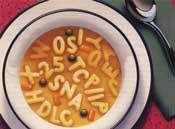Sometimes Fun, Sometimes Not
Dear Joan,
They tell me that one should never try to learn Spanish and Italian at the same time. The fact that they are so alike of course helps
 one a bit over the meanings of words (but Latin would help you almost equally for both) but it makes a confusion in one's mind about grammar and idioms--in the end one makes a horrid soup out of both. I don't know Spanish, but I know there are lovely things in Italian to read. You'll like Boiardo, Ariosto, and Tasso. By the way good easy Latin reading to keep one's Latin up with is the New Testament in Latin. Any Roman Catholic bookshop will have one: say you want a copy of the "Vulgate New Testament." Acts goes specially well in Latin.
one a bit over the meanings of words (but Latin would help you almost equally for both) but it makes a confusion in one's mind about grammar and idioms--in the end one makes a horrid soup out of both. I don't know Spanish, but I know there are lovely things in Italian to read. You'll like Boiardo, Ariosto, and Tasso. By the way good easy Latin reading to keep one's Latin up with is the New Testament in Latin. Any Roman Catholic bookshop will have one: say you want a copy of the "Vulgate New Testament." Acts goes specially well in Latin.I don't think being good always goes with having fun: a martyr being tortured by Nero, or a resistance movement man refusing to give away his friends when tortured by the Germans, were being good but not having fun. And even in ordinary life there are things that would be fun to me but I musn't do them because they would spoil other people's fun. But of course you are quite right if you mean that giving up fun for no reason except that you think it's "good" to give it up, is all nonsense...A perfect man would never act from sense of duty; he'd always want the right thing more than the wrong one.
~C.S. Lewis, Letters to Children, (Letter to Joan _____, July 18, 1957)
_________________________________
Cute Pic of the Day: Courage
Absolutely Amazing Photography: Paul Schillinger <--you need to see this site, it is breathtaking!




5 Comment(s):
"A perfect man would never act from sense of duty; he'd always want the right thing more than the wrong one."
And this is where I realize just how very, very far from perfect I am, because I can almost invariably be counted on wanting to do the wrong thing...*sigh*
Was the New Testament written in Hebrew? I would have thought that much of it was written in Greek or Aramaic in the original. The Old Testament would certainly have been Hebrew, but since most of the New Testament was written to various Greek churches, I would have thought those letters would have been in Greek.
You're right, the NT was written mostly in Greek and a book/or a couple books in Aramaic. I don't remember exactly which books are in Aramaic, but I can find out if anyones interested.
Oh...and a side note...I'm 99% sure (can't find it in my notes at the moment) that the early church used to Septuagent (Greek translation of the original Hebrew OT) when they studied the OT.
I can see the Michelangelo story since Moses is in the OT, but why would the NT be translated from Greek to Hebrew to Latin? Neh. I don't read Greek, Hebrew or Latin, so I suppose I shouldn't worry too much, yeah?
Post a Comment
<< Home